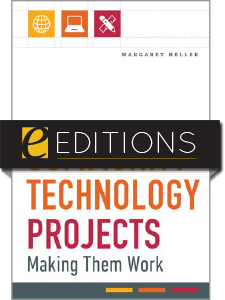
Community Technology Projects: Making Them Work—eEditions e-book
The download link for this product can be found on the final confirmation screen after you complete your purchase, and may also be accessed from your Account Profile. For more information about ALA eEditions file types and how to view them on eReaders, desktop computers, and other devices, see this page.
Primary tabs
You don't need to be an ALA Member to purchase from the ALA Store, but you'll be asked to create an online account/profile during checkout to proceed. This Web Account is for both Members and non-Members. Note that your ALA Member discount will be applied at the final step of the checkout process.
If you are Tax-Exempt, please verify that your account is currently set up as exempt before placing your order, as our new fulfillment center will need current documentation. Learn how to verify here.
- Description
- Table of Contents
- About the author
- Reviews
As a newly minted librarian, Heller volunteered at a grassroots independent library founded to bring together the work of disparate art communities of Chicago. Since then she has participated in many library technology communities with stints on boards, working groups, conference planning committees, and social media-based outreach. Grounded in her research of dozens of community tech projects, Heller presents a guide exploring how they work, how to get involved, and how to make them better. Library technology managers, grantmakers, scholars, and project managers will all benefit from Heller’s incisive discussion of such topics as
- a historical overview, including the humble beginnings of OCLC and early library computerized cataloging projects, that offers lessons for today;
- how to find community needs that match your motivation;
- using personas to learn about community members;
- choosing a name and legal structure for a new community;
- five in-depth case studies, including Project Bamboo, Hathi Trust, and the Digital Public Library of America;
- techniques for project management, documentation, and discussion;
- forging a path from small, grant-funded projects to a sustained collective good;
- reconciling hacker ideology and geek culture with inclusive communities;
- proven methods for supporting tasks and emotions in library tech communities; and
- successes and challenges of vendor user groups.
For readers who want to get started with community technology projects, as well as those who are already engaged in collaborations, the techniques and best practices in Heller’s guide will provide the tools and inspiration to make better library technology communities.
Preface
Chapter 1 What Successful Communities Do
Chapter 2 A History of Community in Library Projects
Chapter 3 Community Best Practices
Chapter 4 The Community Landscape in Library Technology
Chapter 5 Case Studies
Chapter 6 Techniques and Tools
Chapter 7 The Future of Community in Library Technology
References
Index
Margaret Heller
Margaret Heller is Digital Services Librarian at Loyola University Chicago. She has been active in library technology communities, serving on numerous planning committees and the LITA Board of Directors. She is the author of many articles and blog posts about topics including open access, web development, digital collections and services, and inclusion issues in library technology.
”The author has served on numerous library technology planning committees and researched community-oriented projects in library technology over the past decade, and her expertise shines through in this guide, which covers essential information for those looking to get started on community technology projects or to improve existing ones ... While community technology projects present multiple challenges, Heller demonstrates that they can succeed with effort and a willingness to adapt."
— Library Journal


